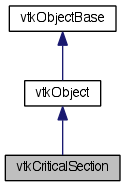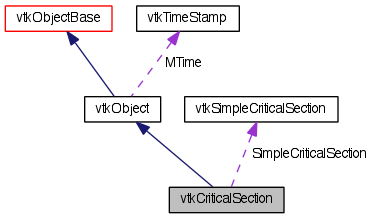Critical section locking class. More...
#include <vtkCriticalSection.h>


Public Types | |
| typedef vtkObject | Superclass |
Public Member Functions | |
| virtual int | IsA (const char *type) |
| vtkCriticalSection * | NewInstance () const |
| void | PrintSelf (ostream &os, vtkIndent indent) |
| void | Lock () |
| void | Unlock () |
Static Public Member Functions | |
| static vtkCriticalSection * | New () |
| static int | IsTypeOf (const char *type) |
| static vtkCriticalSection * | SafeDownCast (vtkObjectBase *o) |
Protected Member Functions | |
| virtual vtkObjectBase * | NewInstanceInternal () const |
| vtkCriticalSection () | |
| ~vtkCriticalSection () | |
Protected Attributes | |
| vtkSimpleCriticalSection | SimpleCriticalSection |
Detailed Description
Critical section locking class.
vtkCriticalSection allows the locking of variables which are accessed through different threads. This header file also defines vtkSimpleCriticalSection which is not a subclass of vtkObject. The API is identical to that of vtkMutexLock, and the behavior is identical as well, except on Windows 9x/NT platforms. The only difference on these platforms is that vtkMutexLock is more flexible, in that it works across processes as well as across threads, but also costs more, in that it evokes a 600-cycle x86 ring transition. The vtkCriticalSection provides a higher-performance equivalent (on Windows) but won't work across processes. Since it is unclear how, in vtk, an object at the vtk level can be shared across processes in the first place, one should use vtkCriticalSection unless one has a very good reason to use vtkMutexLock. If higher-performance equivalents for non-Windows platforms (Irix, SunOS, etc) are discovered, they should replace the implementations in this class
Definition at line 108 of file vtkCriticalSection.h.
Member Typedef Documentation
Reimplemented from vtkObject.
Definition at line 113 of file vtkCriticalSection.h.
Constructor & Destructor Documentation
| vtkCriticalSection::vtkCriticalSection | ( | ) | [inline, protected] |
Definition at line 124 of file vtkCriticalSection.h.
| vtkCriticalSection::~vtkCriticalSection | ( | ) | [inline, protected] |
Definition at line 125 of file vtkCriticalSection.h.
Member Function Documentation
| static vtkCriticalSection* vtkCriticalSection::New | ( | ) | [static] |
Create an object with Debug turned off, modified time initialized to zero, and reference counting on.
Reimplemented from vtkObject.
| static int vtkCriticalSection::IsTypeOf | ( | const char * | name | ) | [static] |
Return 1 if this class type is the same type of (or a subclass of) the named class. Returns 0 otherwise. This method works in combination with vtkTypeMacro found in vtkSetGet.h.
Reimplemented from vtkObject.
| virtual int vtkCriticalSection::IsA | ( | const char * | name | ) | [virtual] |
Return 1 if this class is the same type of (or a subclass of) the named class. Returns 0 otherwise. This method works in combination with vtkTypeMacro found in vtkSetGet.h.
Reimplemented from vtkObject.
| static vtkCriticalSection* vtkCriticalSection::SafeDownCast | ( | vtkObjectBase * | o | ) | [static] |
Reimplemented from vtkObject.
| virtual vtkObjectBase* vtkCriticalSection::NewInstanceInternal | ( | ) | const [protected, virtual] |
Reimplemented from vtkObject.
Reimplemented from vtkObject.
| void vtkCriticalSection::PrintSelf | ( | ostream & | os, |
| vtkIndent | indent | ||
| ) | [virtual] |
| void vtkCriticalSection::Lock | ( | ) | [inline] |
Lock the vtkCriticalSection
Definition at line 133 of file vtkCriticalSection.h.
| void vtkCriticalSection::Unlock | ( | ) | [inline] |
Unlock the vtkCriticalSection
Definition at line 138 of file vtkCriticalSection.h.
Member Data Documentation
Definition at line 123 of file vtkCriticalSection.h.
The documentation for this class was generated from the following file:
- dox/Common/Core/vtkCriticalSection.h
 1.8.0
1.8.0